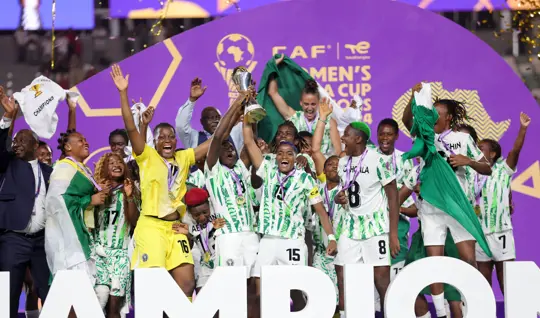WAFCON: The political paradox of Nigeria’s reward system

Nigeria’s Super Falcons in celebration after winning Morocco’s Atlas Lionesses in 2025 WAFCON final. Photo. CAF online
By Anjolaoluwa Ogunpitan
After the Super Falcons achieved a remarkable victory at the 2025 Women’s Africa Cup of Nations (WAFCON), both the federal and state governments in Nigeria generously offered the players and coaching staff various gifts, financial bonuses, and national accolades. While it’s important to celebrate the accomplishments of these athletes, the magnitude and nature of the rewards—which amount to over ₦8.2 billion—deserve thorough scrutiny.
In a country facing significant challenges such as widespread poverty, unpaid pensions, insufficient education funding, and economic instability, this level of extravagance appears not only excessive, but also raises political and ethical concerns.
Overview of the Reward Package
A. Contributions from the Federal Government
Each of the 24 players received:
- The Officer of the Order of the Niger (OON) national honor
- A cash reward of ₦150 million (around $100,000)
- A 3-bedroom residence in Abuja worth approximately ₦100 million
The 11 technical staff members were granted:
- The OON national honor
- ₦75 million in cash
- A 3-bedroom house in Abuja valued at nearly ₦100 million
Total Contributions from the Federal Government:
- For 24 players: 24 × ₦250 million = ₦6 billion
- For 11 staff members: 11 × ₦175 million = ₦1.925 billion
Contributions from State Governments
Each of the 36 governors contributed ₦10 million to the team, resulting in a total of ₦360 million.
Final Total: ₦8.285 Billion
WAFCON Prize Money Compared to Nigeria’s Awards
The Confederation of African Football (CAF) awarded only $500,000 (approximately ₦750 million) to the champions. The government’s financial reward greatly exceeds this amount, being more than 11 times larger.
A Country That Overlooks Its Scholars
While athletes receive significant financial rewards, the nation’s brightest individuals often go unrecognized.
Top JAMB Scorers:
- 2023: Kamsiyochukwu Umeh (Score: 360) — Received ₦2.5 million from a private sponsor
- 2025: The federal government initiated ₦50 million for scholarships across 36 states, averaging about ₦1.38 million per state
Top WAEC Students:
- Lagos: ₦1 million
- Kwara: ₦1 million
- National WAEC: ₦500,000
- Private schools: Up to ₦1.5 million
These exemplary students, who symbolize Nigeria’s future, earn less than 1% of what a footballer receives.
Pensioners and Civil Servants: The Overlooked Workforce
A typical civil servant in Nigeria who retires after 35 years generally receives:
- Gratuity: ₦3 million to ₦8 million
- Monthly Pension: ₦25,000 to ₦80,000
- Payment Delays: Many retirees experience extended waits to receive their entitlements
In stark contrast, a footballer now receives ₦250 million immediately.
The Rise of Superficial Fame: Trends in Reality TV
The issue transcends sports. A recent three-month reality TV show that lacked intellectual or national importance rewarded its winner with:
- ₦150 million in cash
- Numerous brand endorsements
This trend underscores a concerning reality: Nigeria tends to prioritize entertainment and fleeting fame over educational accomplishments and public service.
Discrepancy in National Values
The message conveyed is alarming:
- Engage in sports or appear on television = ₦100 million to ₦250 million
- Attain a score of 360 in JAMB or dedicate 35 years of service = ₦500,000 to ₦5 million overall
This value system glorifies reputation over substantial contributions and leisure over diligence.
A Call for National Balance
It is crucial to recognize excellence. The Super Falcons deserve celebration for their remarkable achievement. However, in a country facing economic difficulties, with over 130 million citizens living in multidimensional poverty, the scale of this reward appears excessive.
Furthermore, many of the players are professionals abroad, enjoying comfortable lifestyles. Their achievement could have been honored with dignity rather than through excessive wealth that overlooks the struggles of everyday Nigerians.
Conclusion
Nigeria must reassess its notions of value and reward. Society should elevate those who educate, build, protect, and care for others, in addition to those who entertain. The concern is not about rewarding the Super Falcons; rather, it is about the disproportionate recognition they receive in light of the pressing national issues at hand.

